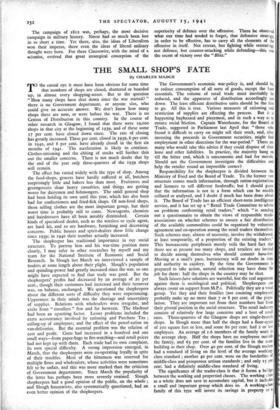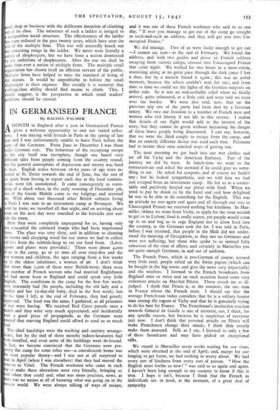THE SMALL SHOP'S FATE
By CHARLES MADGE
TO the casual eye it must have been obvious for some time that numbers of shops are closed, shuttered or boarded up, in almost every shopping-street. But to the question " How many shops have shut down since the war started? " there is no Government department, or anyone else, who could give an accurate answer. We don't know how many shops there are now, or were before the war. There is no Census of Distribution in this country. In the course of other research in Glasgow, I found that there were 19,000 shops in that city at the beginning of 1939, and of these some 17 per cent. have closed down since. The rate of closing has greatly increased. Three per cent. closed in 1939, 6 per cent. in 194o, and 8 per cent. have already closed in the first six months of 1941. The acceleration is likely to continue. Clothes-rationing and the ebbing of stocks will further thin out the smaller concerns. There is not much doubt that by the end of the year only three-quarters of the 1939 shops will remain.
The effect has varied widely with the type of shop. Among the food-shops, grocers have hardly suffered at all, butchers surprisingly little and bakers less than most. Fruiterers and greengrocers show heavy casualties, and things are getting worse for dairymen and fishmongers. The small general shop had been holding its own until this year, which has also been bad for confectioners and fried-fish shops. Of non-food shops, those selling clothes are the most important group, but their worst time is probably still to come. Newsagents, chemists and hairdressers have all been notably diminished. Certain kinds of specialised dealer, such as the wireless or cycle agent, are hard hit, and so are hardware, furnishing and decorating concerns. Public houses and spirit-dealers show little change since 1939; in 1940 their number actually increased.
The shopkeeper has traditional importance in our social structure. To portray him and his war-time position more clearly, I may refer to other researches by myself and my team for the National Institute of Economic and Social Research. In Slough last March we interviewed a sample of traders at some length about their plight. Slough's population and spending-power had greatly increased since the war, so one might have expected to fmd that trade was good. But the shopkeepers' profits had decreased by an average of 20 per cent., though their customers had increased and their turnover was, on balance, unchanged. We questioned the shopkeepers about the different sorts of difficulty they were experiencing.
Uppermost in their minds was the shortage and uncertainty of supplies. Relations with wholesalers were irregular, and visits from " travellers " few and far between. The blackout had been an upsetting factor. Lesser problems included the extra accountancy involved by rationing and Purchase Tax ; calling-up of employees; and the effect of the petrol-ration on van-deliveries. But the essential problem was the relation of cost and profit. Costs had increased in a hundred and one small ways—from paper-bags to fire-watching—and retail prices had not kept up with them. Each trade had its own complaint, its own special difficulty. A strong impression emerged, in March, that the shopkeepers were co-operating loyally in spite of their troubles. Most of the bitterness was reserved for multiple firms and wholesalers, whose activities were sometimes felt to he unfair, and this was more marked than the criticism of Government departments. Since March the popularity of the latter has perhaps been more severely strained. Slough shopkeepers had a good opinion of the public, on the whole ; and Slough housewives, also systematically questioned, had an even better opinion of the shopkeepers. The Government's economic war-policy is, and should be, to reduce consumption of all sorts of goods, except the bare essentials. The volume of retail trade must inevitably be reduced, and the apparatus of distribution accordingly cut down. The least efficient distributive units should be the first to go. All this is true. Various measures of rationing and restriction of supplies are effecting the process. But it is happening haphazard and piecemeal, and in such a way as to ensure social friction. Captain Waterhouse, for the Board of Trade, suggested in Parliament last April that " those who found it difficult to carry on might sell their stock, and, after investing the proceeds in Government securities, might find employment in other directions for the war-period." There are many who would take this advice if they could dispose of their lease and other liabilities. In practice, the majority hang on till the bitter end, which is uneconomic and bad for morale. Should not the Government investigate the difficulties and help the retailer round an impossible corner?
Responsibility for the shopkeeper is divided between the Ministry of Food and the Board of Trade. To the former vast structure comes much information, through ration-registrations and licences to sell different foodstuffs; but I should guess that the information is not in a form which can be readily collated or analysed, and I doubt if much has been done about it. The Board of Trade has an efficient short-term intelligence service, and it has set up a " Retail Trade Committee to advise on problems confronting retail traders," which " is sending out a questionnaire to obtain the views of responsible trade- associations on whether schemes to ensure a fair distribution of the available commodities could be organised by voluntary agreement and co-operation among the retail traders themselves. Such schemes may, almost of necessity, involve the withdrawal. at least temporarily, of a proportion of the existing traders. This bureaucratic periphrasis merely veils the hard fact that there are at present too many shops, and retailers are invited to decide among themselves who should commit hara-kiri. Moving at a snail's pace, bureaucracy will no doubt in time add authority to cajolery. By the time the Government is prepared to take action, natural selection may have done the job for them: half the shops in the country may be shut.
Such laissez-faire solutions are wasteful, but the real argument against them is sociological and political. Shopkeepers can always count on support from M.P.s. Politically they are a vocal group. Yet they and their families (not counting employees) probably make up no more than 7 or 8 per cent. of the popu- lation. They are important not from their numbers but from their pivotal position in the social structure. The retail industry consists of relatively few large concerns and a host of small ones. Three-quarters of the Glasgow shops are single-branch shops. In Slough more than half the shops had a floor-space of 200 square feet or less, and some 8o per cent. had 2 or less employees. An average of 1.6 members of the family work in the average shop. Half the shops have no employees outside the family, and 63 per cent. of the families live in the same building as their shop. Over 4o per cent. of the Slough traders had a standard of living on the level of the average working- class standard ; another 4o per cent. were on the borderline of middle-class and prosperous artisan standards ; and only 15 per cent. had a definitely middle-class standard of living.
The significance of the trader-class is that it forms a bridge between the working and propertied classes. The working class as a whole does not save to accumulate capital, but it includes a small and important group which does so. A working-class family of this type will invest its savings in property or wall shop or business with the deliberate intention of climbing ut of its class. The existence of such a ladder is integral to competitive social structure. The effectiveness of the ladder s been reduced in the past twenty years, which have seen the se of the multiple firm. This war will assuredly knock out remaining rungs in the ladder. We never were literally a ation of shopkeepers, but we have been a nation dominated y the ambitions of shopkeepers. After the war we shall be ore than ever a nation of multiple firms. The multiple retail rganisation has shown itself an efficient servant of the public. uluple firms have helped to raise the standard of living of masses. It would be unprofitable to bolster the small hopkeeper at their expense. But socially it is essential that orking-class ability should find means to climb. This, I ould suggest, is the perspective in which small traders' roblems should be viewed.



























 Previous page
Previous page